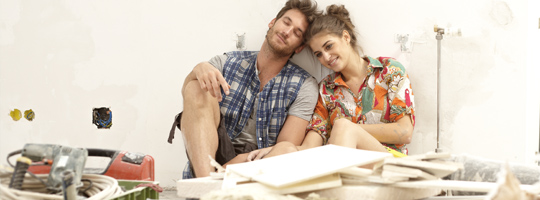23 Jun June 2016
Welcome to our June newsletter

In this months newsletter we look into why it’s a great time to get your budget under control, why our investors love tax time and 5 tips to renovate for profit!
With wild storms threatening to disrupt property markets all around the country, winter has set in but activity hasn’t cooled!
The Reserve Bank of Australia (RBA) met for its June meeting last week and decided to keep the official cash rate on hold at 1.75%. With low inflation rates and the Aussie dollar creeping higher, forecasters are predicting that the next rate cut may come as soon as August.
Despite a wild start to winter in many capital cities, property markets have been performing well around the country. For the week ending Sunday 05 June, there were 1960 scheduled auctions. Victoria had the highest number of auctions with 959 achieving a clearance rate of 71%. NSW held 654 auctions which achieved a clearance rate of 77%.
During May, home value growth was strong across all capital cities except for Perth where home values fell by 2.65%. Sydney home values increased by 3.09%, Melbourne 1.63%, Brisbane/Gold Coast 0.21%, Adelaide 0.08%, Darwin 0.74%, Canberra 2.49% and Hobart 2.16%.
Following the RBA’s decision to cut the cash rate last month, lenders have cut interest rates on home loan products across the board. Call us now to check your rate on your existing home loan, or to switch to a fixed rate product. We can also access some amazing rates if you are a first home buyer, next home buyer, property investor or are just looking to refinance. Give us a call today.
EOFY: Why property investors love tax time
Tips to help property investors maximise their tax returns
Don’t you just love getting a tax refund? Whilst nobody enjoys all the paperwork that goes with filing a tax return, getting it right can be rewarding particularly if you’re a property investor. One of the major benefits of investing in property over other asset classes, is support for your investment from the Australian government in the form of tax relief. And of course, if you have a property investment or are considering investing in property soon, you won’t want to miss out on a single cent from any of the deductions that are available to you. Here are some tips to help you maximise your tax benefits this financial year if you are a property investor.
Make sure you’re claiming every cent you can for depreciation.

Depreciation is one of the major tax benefits that property investors can claim. Depreciation occurs as an item’s worth becomes less over time as it is used and it wears out. When you’re talking about a tax deduction, depreciation is a method of allocating the cost of an item over its useful life. For example, if your investment property has an oven that is valued at $1,000 and has a ten year life, you can claim $100 against your taxable income for 10 years on that individual item.
With an investment property, you are only allowed to claim depreciation on certain items against your taxable income. There are two types of depreciation tax deductions that you can claim:
- Depreciation on plant & equipment: this refers to items within the building like ovens, hot water heaters, air conditioners, carpets, blinds, light fittings and so on.
- Depreciation on buildings or ‘building allowance’: this refers to the construction costs of the building itself, such as concrete, brickwork, and so on.
In order to make a tax claim for depreciation, you need a report that identifies all the things that may be claimed against your tax and the current value of each item. This is called a depreciation schedule. Unfortunately, the Australian Tax Office will not allow you to create your own depreciation schedule, you’ll need to employ the services of a qualified Quantity Surveyor to do a thorough inspection to identify what can be claimed and make the necessary valuations on those items. But don’t worry, the cost of preparing your depreciation schedule is also tax deductible.
Spend money on property maintenance now so you can claim it back right away.
Every investment property requires maintenance and if you do it in June, you won’t be out of pocket for the expense for very long. If your property’s smoke detectors need servicing, or you haven’t sent the pest control company around for a while, now is a good time to do it. Cleaning, gardening and lawn mowing costs are also usually tax deductible (for you, not your tenant). Any other necessary repairs, maintenance and service costs – like checking the gas and hot water heaters for example, are also tax deductible for most property investors, so consider taking care of any issues before the end of the financial year.
Get back the other money you hate to spend.
When you own a property, it sometimes seems like you have to pay out a lot of money for invisible things that don’t have much benefit for you, which can be annoying. Tax time is when you can get your own back, with land tax, council and water rates, property management fees, advertising costs for marketing the property to tenants, body-corporate and strata-title fees all tax deductible expenses. You can also claim back any travel and car expenses directly related to inspecting your investment properties, but do keep a log book and any relevant receipts.
Remember to claim your finance and insurance costs.
Generally speaking, you are allowed to claim all finance costs associated with your property investment, including bank fees and charges, borrowing costs and interest on your loans. All insurance costs for your investment property are also tax deductible. So if you talk to us about your insurance coverage now, we can make sure you have the right cover for your current needs just in time for you to put in a claim for the cost with this year’s tax return.
Remember, if you’re a property investor or are considering investing in property soon, we’re here to help you get your finances right. We can help you access a loan structure that’s right for your ongoing investment strategy and help you access the most competitive rate available for you considering your personal financial circumstances and goals.
It’s a great time to get your budget under control!

Here’s some great end of financial year budget ideas for home buyers.
Getting your budget under control and your finances in order is absolutely essential to anyone looking to apply for a home loan, but it’s particularly important for first home buyers about to take the first step on the property ladder. Now the end of financial year has arrived and you’re getting all your paperwork together for your tax return, why not take stock of your financial situation and plan your budget for the year ahead at the same time? Here’s a few things to consider if you’re looking to get financially fit for a home loan application in the new financial year.
Reassess your budget and get serious about your savings.
When you apply for a home loan, particularly as a first home buyer, it is important to have a thorough understanding of your financial situation and good savings habits. Lenders will want to see an established history of regular savings before they will give you their best rate on a home loan and for this reason, you should take a realistic look at your spending habits and create yourself a budget to ensure your savings will grow at a steady rate.
Work out how much deposit you’ll need and set yourself a savings target.
If you set yourself a savings target, you may find it will be much easier to stick to your budget. To set your target, first you’ll need to work out how much you need for your deposit. The amount of deposit you will need will depend on the cost of the property you want to buy, but if you have an idea of the kind of property you want to purchase you’ll be able to set a goal. It’s recommended that you have a deposit of at least 5% of the purchase price, however if you can possibly save 20% of the purchase price you’ll avoid paying Lenders Mortgage Insurance.
Make an accurate assessment of any debts and ongoing expenses.
Lenders assess your creditworthiness on the amount of money you already owe, your ability to repay your debts and your capacity to take on more debt. Paying down any credit card debts or personal loans prior to applying for your home loan will improve your borrowing capacity and give you the best chance of loan approval when you apply.
Even if you don’t have any debt on your credit cards, lenders take into consideration the credit limit on your credit cards and count this as potential debt. So if you have several credit cards, it may be a good idea to cancel some of them now if you are planning on applying for a home loan in the next financial year.
If you have a lot of debts, think about consolidating them.
If you take stock of your debts and realise you won’t be able to pay them all off anytime soon, it’s a good idea to look at ways to reduce your interest liability. Credit cards, store cards, short-term personal loans and cash advances all carry high interest rates and this can make them quite difficult to pay down. Getting your finances in order may mean it’s time to consolidate your debts.
Consolidating your debts means rolling all your debts into one, usually using a loan that has a lower interest rate. If you have quite a few expensive debts it may be possible to roll these into your home loan if you have one, or perhaps a personal loan that carries a lower interest rate overall. This may save you a great deal of money on interest payments, which is money you could use to pay off your debts faster. It could also allow you to spread your repayments over time, making them more affordable. If you want to be eligible to apply for a home loan in the next financial year, consolidating your debts sooner rather than later may be a good idea.
The end of financial year is a great time to get your finances in order and you never know, you may get a tax refund that could really give a boost to your savings efforts for a deposit for your home! Remember, we’re here to help you get your finances under control so you can save your deposit and get into your new home sooner. If you’re planning on applying for a home loan in the next financial year, don’t hesitate to give us a call today.
Renovating for profit: 5 tips to minimise your risks and maximise your gains.

Looking to immediately increase the value of your next property purchase?
Property investment is usually considered a long-term investment strategy, however many investors today are much more ambitious and look for ways to maximise their returns in the shorter-term. One popular way to go about it is to use a ‘renovation strategy’ to instantly increase the value of the property. But whilst it’s certainly true that renovating for profit can bring big rewards when it’s done right, it’s not as easy as it sounds and can carry greater risks. If you’ve been thinking about renovating for profit, here’s 5 tips on how to minimise those risks and maximise your gains.
1. Make your profit when you buy.
According to renovate for profit investors, this is the golden rule. In order to profit from a renovation project, you need to make sure that you buy the right property at the right price. It is very important that you do not pay too much for the property in the first place, as over capitalising a property is your biggest risk.
Do your research and find out what the property is likely to sell for once it is renovated. Subtract the costs of buying and selling, the costs of your renovations, any taxes you may have to pay, and your profit margin. That will give you a budget for the initial purchase price of the property.
If you can find a property that is at least 20% below market value, then you may be on a winner and it may be worth further investigation.
2. Look for a property that is structurally sound.
In order to maximise your return on your renovation dollar, you should look for a property that only requires cosmetic improvements, like painting, interior layout reorganisation, new kitchens and bathrooms, new carpets and a garden makeover. Such renovations are inexpensive and quick to complete, but they generate maximum buyer appeal and that will help to maximise your profit.
Buyers can’t see structural improvements like a new roof, re-wiring or re-stumping, but these necessary repairs can cost a lot of money and take up a lot of time. You also want to avoid having to deal with expensive problems like termites and subsidence, so make sure you get a building and pest inspection before you buy.
3. Get professional advice about renovation costs.
This is particularly important if you are not a DIY renovator and need to use tradesmen to complete the required work on a project. Making your own “guesstimate” will not make you wealthy! If you plan to add rooms, move walls, put in a new bathroom, and paint the entire place inside and out – you’ll need professional help to get it all done in a reasonable time frame. And if you want to make a profit, you’ll need to know exactly how much this will all cost. While you’re still deciding if the property is a good renovate for profit investment prospect, get the builders in to give you a quote so you can be realistic about how much it will cost to make the improvements you want and find out if that will leave you any room for profit.
4. Make a budget and stick to it.
Over capitalisation is one of the biggest risks in a renovating for profit strategy. Many people don’t operate to a tight budget and it is very easy to overspend if you don’t plan your budget carefully before you start. If things get out of control and you spend an extra $30,000 more than you intended, it is very unlikely that the end value of the property will increase accordingly to pay you back and you may find yourself making a loss.
Getting carried away with your renovations is a common mistake, particularly in the décor department. People often make the mistake of going for expensive fixtures and fittings when a more modestly priced version would do just as well. Buyers will seldom turn away from a property if it does not have a top of the range European cooker, but they will walk away if the asking price for the property is $30,000 more than comparable homes in the area.
5. Get your finance in place for the whole project.
A mistake people often make is to rush in to buy the property without considering where they will get the money required to make the necessary renovations. That’s why you should talk to us – your professional mortgage brokers – before you do anything. We can help you to organise finance suitable for your entire project from the outset, which can help you to avoid a lot of hassle and expense. Finding the right loan for your needs could help you to save money on interest and avoid expensive exit costs when you sell.
If you’re looking to buy a property to renovate for profit, give us a call today. We’ll be more than happy to help you work out your budget and make your plans so you can get started sooner. And we’ll help you to get pre-approval on finance that’s tailored to your budget, project, personal financial circumstances and end goals.


